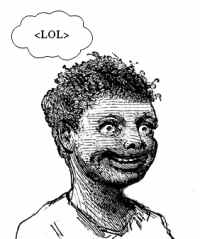 Are our minds being dumbed by digits – or set free by unreading?
Are our minds being dumbed by digits – or set free by unreading?
Frank Furedi notes that it has become common to deplore a growing tendency to inattention. In fact, he says, this kind of complaint goes back to the eighteenth century. Very early on the failure to concentrate was treated as a moral failing rather than simple inability; Furedi links this with the idea that attention to proper authority is regarded as a duty, so that inattention amounts to disobedience or disrespect. What has changed more recently, he suggests, is that while inattention was originally regarded as an exceptional problem, it is now seen as our normal state, inevitable: an attitude that can lead to fatalism.
The advent of digital technology has surely affected our view. Since the turn of the century or earlier there have been warnings that constant use of computers, and especially of the Internet, would change the way our brains worked; would damage us intellectually if not morally. Various kinds of damage have been foreseen; shortened attention span, lack of memory, dependence on images, lack of concentration, failure of analytical skills and inability to pull the torrent of snippets into meaningful structures. ‘Digital natives’ might be fluent in social media and habituated to their own strange new world, but there was a price to pay. The emergence of Homo Zappiens has been presented as cause for concern, not celebration.
Equally there have been those who suggest that the warnings are overstated. It would, they say, actually be strange and somewhat disappointing if study habits remained exactly the same after the advent of an instant, universal reference tool; the brain would not be the highly plastic entity we know it to be if it didn’t change its behaviour when presented with the deep interactivity that computers offer; and really it’s time we stopped being surprised that changes in the behaviour of the mind show up as detectable physical changes in the brain.
In many respects, moreover, people are still the same, aren’t they? Nothing much has changed. More undergraduates than ever cope with what is still a pretty traditional education. Young people have not started to find the literature of the dark ages before the 1980s incomprehensible, have they? We may feel at times that contemporary films are dumbed down, but don’t we remember some outstandingly witless stuff from the 1970s and earlier? Furedi seems to doubt that all is well; in fact, he says, undergraduate courses are changing, and are under pressure to change more to accommodate the flighty habits of modern youth who apparently cannot be expected to read whole books. Academics are being urged to pre-digest their courses into sets of easy snippets.
Moreover, a very respectable recent survey of research found that some of the alleged negative effects are well evidenced.
Growing up with Internet technologies, “Digital Natives” gravitate toward “shallow” information processing behaviors characterized by rapid attention shifting and reduced deliberations. They engage in increased multitasking behaviors that are linked to increased distractibility and poor executive control abilities. Digital natives also exhibit higher prevalence of Internet-related addictive behaviors that reflect altered reward-processing and self-control mechanisms.
So what are we to make of it all? Myself, I take the long view; not just looking back to the early 1700s but also glancing back several thousand years. The human brain has reshaped its modus operandi several times through the arrival of symbols and languages, but the most notable revolution was surely the advent of reading. Our brains have not had time to evolve special capacities for the fairly recent skill of reading, yet it has become almost universal, regarded as a natural accomplishment almost as natural as walking. It is taken for granted in modern cities – which increasingly is where we all live – that everyone can read. Surely this achievement required a corresponding change in our ability to concentrate?
We are by nature inattentive animals; like all primates we cannot rest easy – as a well-fed lion would do – but have to keep looking for new stimuli to feed our oversized brains. Learning to read, though, and truly absorbing a text, requires steady focus on an essentially linear development of ideas. Now some will point out that even with a large tome, we can skip; inattentive modern students may highlight only the odd significant passage for re-reading as though Plato need really only have written fifty sentences; some courteously self-effacing modern authors tell you which chapters of their work you can ignore if you’re already expert on A, or don’t like formulae, or are only really interested in B. True; but to me those are just the exceptions that highlight the existence of the rule that proper books require concentration.
No wonder then, that inattention first started to be seriously stigmatised in the eighteenth century, just when we were beginning to get serious about literacy; the same period when a whole new population of literate women became the readership that made the modern novel viable.
Might it not be that what is happening now is that new technology is simply returning us to our natural fidgety state, freed from the discipline of the long, fixed text? Now we can find whatever nugget of information we want without trawling through thousands of words; we can follow eccentric tracks through the intellectual realm like an excitable dog looking for rabbits. This may have its downside, but it has some promising upsides too: we save a lot of time, and we stand a far better chance of pulling together echoes and correspondences from unconnected matters, a kind of synergy which may sometimes be highly productive. Even those old lengthy tomes are now far more easily accessible than they ever were before. The truth is, we hardly know yet where instant unlimited access and high levels of interactivity will take us; but perhaps unreading, shedding some old habits, will be more a liberation than a limitation.
But now I have hit a thousand words, so I’d better shut up.

 I see that while I was away the Internet has been getting a certain amount of stick over the way it allegedly alters our mental processes for the worse. Some of this
I see that while I was away the Internet has been getting a certain amount of stick over the way it allegedly alters our mental processes for the worse. Some of this